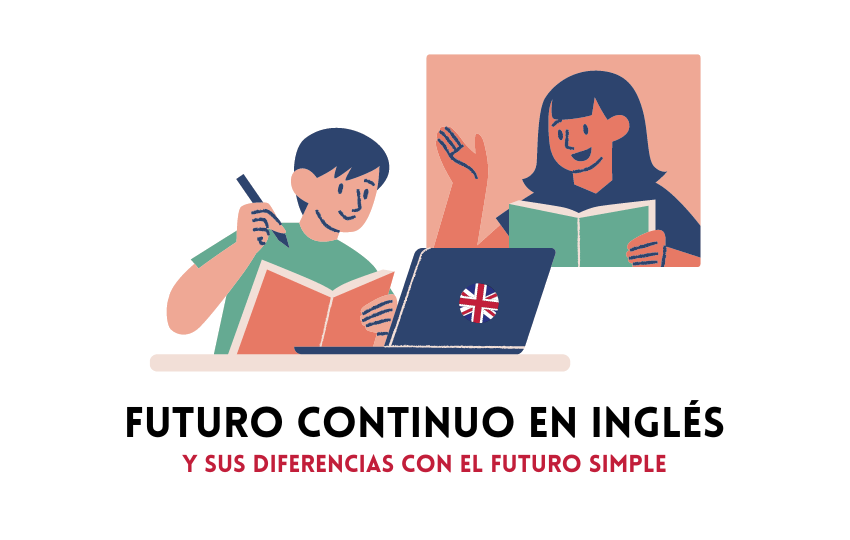Futuro continuo en Inglés: Teoría y Ejercicios para Evitar Errores

El dominio del inglés como segundo idioma es una habilidad cada vez más valorada en el mundo globalizado de hoy. Entre los aspectos más desafiantes de aprender inglés se encuentra la comprensión y el uso correcto de los tiempos verbales. En este artículo, nos centraremos en el futuro continuo en inglés, un tiempo verbal que, aunque no se usa a diario, es esencial para expresar acciones que tendrán lugar en el futuro y tendrán cierta duración.
¿Qué es el Futuro Continuo?
El futuro continuo en inglés se utiliza para hablar de acciones que aún no han sucedido pero que se espera que ocurran y tengan una duración específica en el futuro. Este tiempo verbal se forma con el auxiliar "will" o "shall" seguido de "be" y el verbo principal en su forma "-ing".
Por ejemplo:
- "I will be learning English this year." (Estaré aprendiendo inglés este año.)
- "She will be eating tacos tonight." (Ella estará comiendo tacos esta noche.)
Tabla de Referencia Rápida: Futuro Continuo en Inglés
| Futuro Simple | Futuro Continuo |
|---|---|
| Sujeto + will + verbo en su forma base + complemento | Sujeto + will + be + verbo –ing + complemento |
| Ejemplo: "I will learn English." | Ejemplo: "I will be learning English." |
Diferencias entre el Futuro Simple y el Futuro Continuo
Es importante distinguir entre el futuro simple y el futuro continuo. Mientras que el futuro simple se utiliza para acciones o condiciones que iniciarán y terminarán en el futuro, el futuro continuo se utiliza para expresar una acción que se realizará en el futuro y tendrá cierto tiempo de duración.
Por ejemplo:
- Futuro simple: "I will learn English." (Aprenderé inglés.)
- Futuro continuo: "I will be learning English." (Estaré aprendiendo inglés.)
Usos del Futuro Continuo
El futuro continuo tiene varios usos específicos:
- Para describir una acción en desarrollo en el futuro que será interrumpida: Por ejemplo, "Jose will be watching the news when you call." (Jose estará viendo las noticias cuando le llames.)
- Para hablar sobre acciones en un tiempo específico en el futuro: Por ejemplo, "We will still be working at 10 o'clock tomorrow night." (Todavía estaremos trabajando a las 10 de la noche mañana.)
Ejercicios Prácticos
Para ayudarte a dominar el futuro continuo, aquí tienes algunos ejercicios que puedes practicar:
1. Completa las oraciones con la forma correcta del futuro continuo.
- "They can go to the theater tonight. I _____________ dinner for the kids while they’re out."
- "John and Anna _______________ in New York by the next month."
- "Donna is 2 years old, she _____________ to school, by this time next year."
2. Reescribe las siguientes oraciones en forma interrogativa.
- "Dr. Johnson will be attending the conference in Washington."
- "I will be going home for the holidays."
- "She will be having a work interview."
3. Elige la opción correcta para completar las oraciones.
- "We can watch a movie this evening. The kids ___________ to bed by then."
- "By 11 o’clock tomorrow, she___________ her driving exam."
- "She ___________ in London this time next year."
Soluciones:
1: Forma correcta del futuro continuo.
- "They can go to the theater tonight. I will be cooking dinner for the kids while they’re out."
- "John and Anna will be living in New York by the next month."
- "Donna is 2 years old, she will be going to school, by this time next year."
2: Forma interrogativa.
- "Dr. Johnson will be attending the conference in Washington." -> "Will Dr. Johnson be attending the conference in Washington?"
- "I will be going home for the holidays." -> "Will I be going home for the holidays?"
- "She will be having a work interview." -> "Will she be having a work interview?"
3: Opción correcta para completar las oraciones.
- "We can watch a movie this evening. The kids will have gone to bed by then."
- "By 11 o’clock tomorrow, she will have taken her driving exam."
- "She will be living in London this time next year."
Dominar el futuro continuo en inglés requiere práctica y paciencia. Sin embargo, con el tiempo, te sentirás más cómodo usándolo en tus conversaciones y escritos en inglés. Recuerda que el aprendizaje de un idioma es un viaje, no un destino. ¡Sigue practicando y verás grandes mejoras!
Conclusión
El futuro continuo es una parte esencial de la gramática inglesa que te permite expresar acciones que ocurrirán en el futuro y tendrán una duración específica. Aunque puede parecer desafiante al principio, con práctica y paciencia, te sentirás cada vez más cómodo usándolo. ¡Sigue practicando y no te des por vencido!
